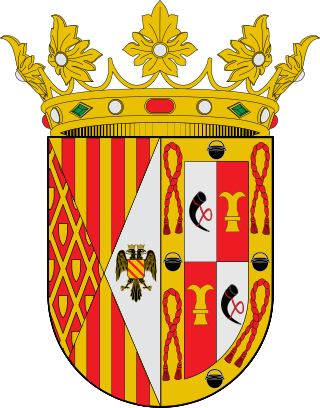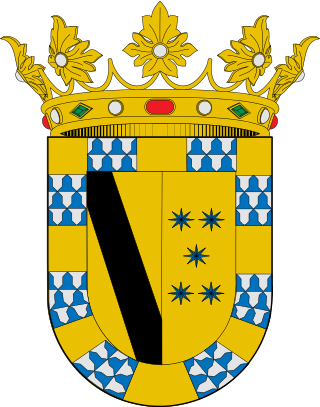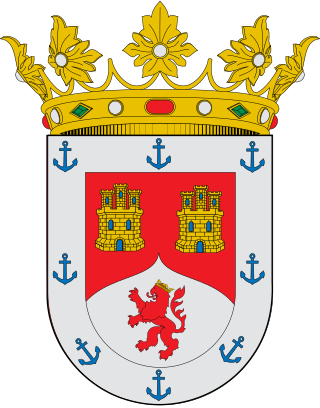
The Spanish nobility are people who possess a title of nobility confirmed by the Spanish Ministry of the Presidency, Justice and Relations with the Cortes, as well as those individuals appointed to one of Spain's three highest orders of knighthood: the Order of the Golden Fleece, the Order of Charles III and the Order of Isabella the Catholic. Some members of the Spanish nobility possess various titles that may be inherited or not, but the creation and recognition of titles is legally the prerogative of the monarchy of Spain.

Duke of Osuna is a Spanish noble title that was first awarded in 1562 by King Philip II of Spain to Pedro Girón de la Cueva,. Pedro was also Viceroy of Naples, (1582–1586), Ambassador in Portugal and 5th Count of Ureña.

Juan Manuel Fernández Pacheco y Zúñiga, Duke of Escalona and Marquess of Villena, was a Spanish aristocrat, politician, and academician who founded the Royal Spanish Academy.

Andrés María Hipólito Casiano José Antonio Cayetano Fernández Pacheco y Moscoso Acuña Silva Manrique Girón Portocarrero y Portugal, twice Grandee of Spain, 10th Duke of Escalona, 10th Marquis of Villena, 16th Count of Castañeda, 12th Count of San Esteban de Gormaz and 10th Count of Xiquena, was a Spanish aristocrat and academician.

Diego Enríquez de Guzmán, 5th count of Alba de Liste, Viceroy of Sicily (1585–1591), a Knight of the Order of the Golden Fleece since the year 1600, was the son of Enrique Enriquez, 4th count of Alba de Liste, and Maria Alvarez de Toledo y Pimentel, one daughter of Garcia Alvarez de Toledo, 2nd duke of Alba and of Beatriz Pimentel, a daughter of the 4th count and 1st duke of Benavente since January 1473, Rodrigo Alfonso Pimentel.

Juan Pacheco, 1st Duke of Escalona, better known as Juan Pacheco, Marquess of Villena, was a Castilian noble of Portuguese descent who rose to power in the last years of the reign of Juan II of Castile and came to dominate the government of Castile during the reign of Juan II’s son and successor Henry IV of Castile. Created The 1st Duke of Escalona in 1472, his other titles included, among others, Marquess of Villena and Master of the Order of Santiago.

Marquess of Villena is a hereditary title in the Peerage of Spain, granted in 1445 by John II to Juan Pacheco, Grand Master of the Order of Santiago and later also 1st Duke of Escalona.
Diego Pacheco Téllez-Girón Gómez de Sandoval, also called Diego Fernández de Velasco y Pacheco or Diego Pacheco Telles Giron Fernandez de Velasco y Enrique, was a Spanish noble and politician, who supported the French during the Peninsular War, and who was therefore known as an Afrancesado.
The Caballerizo mayor was the Officer of the Royal Household and Heritage of the Crown of Spain in charge of the trips, the mews, and the hunt of the King of Spain.
The Mayordomo mayor was the Officer of the Royal Household and Heritage of the Crown of Spain in charge of the person and rooms of the King of Spain. The Office of “Mayordomo mayor” was suppressed after the proclamation of the Second Spanish Republic in 1931 and never re-created after the restoration of the Monarchy in 1975, but it can be said that it is the historical precedent of the modern Head of the Royal Household of Spain.
The Sumiller de Corps was the Officer of the Royal Household and Heritage of the Crown of Spain in charge of the more intimate and inner rooms of the King of Spain. He was responsible of the most immediate service to the Monarch. This Office was suppressed after the proclamation of the Second Spanish Republic in 1931 and never re-created after the restoration of the Monarchy in 1975.

Duke of Béjar is a hereditary title in the Peerage of Spain, accompanied by the dignity of Grandee and granted in 1485 by the Catholic Monarchs to Álvaro de Zúñiga, 1st Duke of Plasencia and chief justice of Castile.

Duke of Benavente is a hereditary title in the Peerage of Spain, accompanied by the dignity of Grandee and granted in 1473 by Henry IV to Rodrigo Alonso Pimentel, 4th Count of Benavente.
Marquess of Lombay is a noble title created by King Charles V of Spain in favor of Saint Francis Borgia Grandee of Spain, Duke of Gandia. on 7 July 1530.
Ángela María Téllez-Girón y Duque de Estrada, 16th Duchess of Osuna, GE (1925–2015) was a Spanish noblewoman. She was a holder of ten grandeeships of Spain.

Duke of Mandas y Villanueva, commonly known as Duke of Mandas, is a title of Spanish nobility that is accompanied by the dignity of Grandee of Spain. It was granted along with the Marquessate of Terranova to Pedro Maza de Lizana on 23 December 1614 by king Philip III.

Duke of Lerma is a hereditary title in the Peerage of Spain accompanied by the dignity of Grandee, granted in 1599 by Philip III to Francisco Gómez de Sandoval, 4th Count of Lerma and his royal favourite.

Duke of Medina de Rioseco is a hereditary title in the Peerage of Spain, accompanied by the dignity of Grandee and granted in 1538 by Charles I to Fernando Enríquez de Velasco, Admiral of Castile and Lord of Medina de Rioseco.












